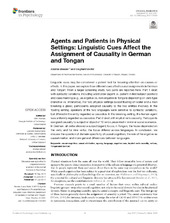Agents and patients in physical settings: Linguistic cues affect the assignment of causality in German and Tongan
| dc.contributor.author | Bender, Andrea | |
| dc.contributor.author | Beller, Sieghard | |
| dc.date.accessioned | 2018-08-13T12:40:26Z | |
| dc.date.available | 2018-08-13T12:40:26Z | |
| dc.date.issued | 2017-07-07 | |
| dc.Published | Bender A, Beller S. Agents and patients in physical settings: Linguistic cues affect the assignment of causality in German and Tongan. Frontiers in Psychology. 2017;8:1093 | eng |
| dc.identifier.issn | 1664-1078 | |
| dc.identifier.uri | https://hdl.handle.net/1956/18046 | |
| dc.description.abstract | Linguistic cues may be considered a potent tool for focusing attention on causes or effects. In this paper, we explore how different cues affect causal assignments in German and Tongan. From a larger screening study, two parts are reported here: Part 1 dealt with syntactic variations, including word order (agent vs. patient in first/subject position) and case marking (e.g., as ergative vs. non-ergative in Tongan) depending on verb type (transitive vs. intransitive). For two physical settings (wood floating on water and a man breaking a glass), participants assigned causality to the two entities involved. In the floating setting, speakers of the two languages were sensitive to syntactic variations, but differed in the entity regarded as causative. In the breaking setting, the human agent was uniformly regarded as causative. Part 2 dealt with implicit verb causality. Participants assigned causality to subject or object of 16 verbs presented in minimal social scenarios. In German, all verbs showed a subject (agent) focus; in Tongan, the focus depended on the verb; and for nine verbs, the focus differed across languages. In conclusion, we discuss the question of domain-specificity of causal cognition, the role of the ergative as causal marker, and more general differences between languages. | en_US |
| dc.language.iso | eng | eng |
| dc.publisher | Frontiers | eng |
| dc.rights | Attribution CC BY | eng |
| dc.rights.uri | http://creativecommons.org/licenses/by/4.0 | eng |
| dc.subject | causal cognition | eng |
| dc.subject | causal attribution | eng |
| dc.subject | agency | eng |
| dc.subject | language | eng |
| dc.subject | ergative case | eng |
| dc.subject | implicit verb causality | eng |
| dc.subject | culture | eng |
| dc.subject | Tongan and German | eng |
| dc.title | Agents and patients in physical settings: Linguistic cues affect the assignment of causality in German and Tongan | eng |
| dc.type | Peer reviewed | |
| dc.type | Journal article | |
| dc.date.updated | 2018-03-06T10:28:20Z | |
| dc.description.version | publishedVersion | |
| dc.rights.holder | Copyright 2017 The Author(s) | eng |
| dc.identifier.doi | https://doi.org/10.3389/fpsyg.2017.01093 | |
| dc.identifier.cristin | 1537067 | |
| dc.source.journal | Frontiers in Psychology |

